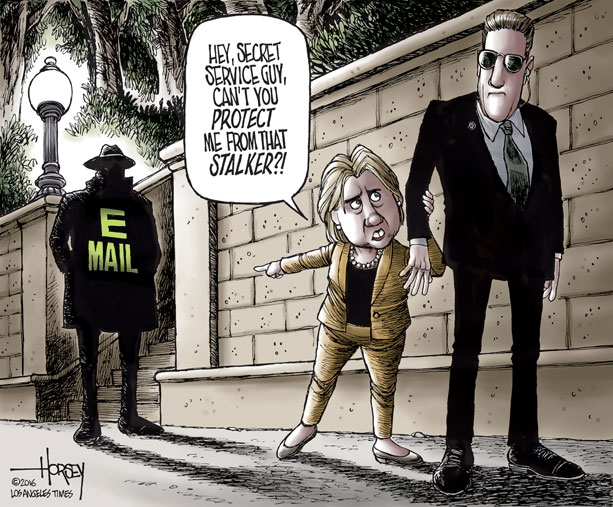
The public learned on March 10, 2015, that Hillary Clinton had more than 60,000 emails on her private email system, and that she had turned over "about half" of them to the State Department and destroyed the rest, which she said were "personal" and "not in any way related" to her work as secretary of state.
The public learned later the lengths to which Clinton went to make sure the "personal" emails were completely and permanently deleted.
Her team used a commercial-strength program called BleachBit to erase all traces of the emails, and they used hammers to physically destroy mobile devices that might have had the emails on them. The person who did the actual deleting later cited legal privileges and the Fifth Amendment to avoid talking to the FBI and Congress.
Clinton's lawyer, David Kendall, told Rep. Trey Gowdy, chairman of the House Benghazi Committee, that investigators could forget about finding any of those emails. Sorry, Trey, he said; they're all gone.
Still, there were people who did not believe that Clinton's deleted emails, all 30,000-plus of them, were truly gone. What is ever truly gone on the internet? And what if Clinton were not telling the truth? What if she deleted emails covering more than just personal matters? In that event, recovering the emails would have rocked the 2016 presidential campaign.
So if there were an enormous trove of information potentially harmful to a presidential candidate just sitting out there -- what opposing campaign wouldn't want to find it?
There have been recent reports that last summer a Republican named Peter W. Smith made some sort of effort to find the missing Clinton emails, getting in touch with hackers, some of whom may have been Russian. But nothing came of it, and no evidence has emerged that Smith was connected to the Trump campaign. (The 81-year-old Smith later committed suicide, apparently distraught over failing health.)
In a recent phone conversation, Corey Lewandowski, the Trump campaign manager who was fired on June 20, 2016, said he never heard of or communicated with Smith, and wasn't aware of any effort to find the missing Clinton emails.
"I never solicited, or asked anybody to solicit or find a way to get these potential emails," Lewandowski said. "And to the best of my knowledge, nobody [in the campaign] did either."
Still, Lewandowski added that, "In the world of cybersecurity, it's fairly well known that when you delete emails, they're not gone." Another former top Trump aide said that was a common view in the campaign. "The feeling was that they [the emails] must exist somewhere," the former aide said, "because once something is digital, it's never truly gone."
"Trump believes that," the aide added. Still, the aide also said he had never heard of Smith, and didn't know of any effort to find the emails.
Both Lewandowski and the other former aide stressed the greatest political value of the missing emails, as far as Trump was concerned, was that they gave Trump a way to "poke" and "troll" his Democratic opponent. The Clinton team was BleachBitting and swinging hammers to smash devices -- and she says everything was on the up and up, that she has nothing to hide? Candidate Trump could riff on that all day.
But at least one high-ranking Trump team member apparently did believe the missing Clinton emails still existed. In August 2016, Gen. Michael Flynn, then the Trump campaign's top national security adviser, discussed the emails with a conservative radio host named John B. Wells.
"Does somebody have the 30,000?" Flynn asked. "The likelihood somebody has all of those emails, at a nation-state level, meaning Russia, China, Iran, North Korea, or even other countries, or some other large hacktivist group, like the WikiLeaks group that we know exists -- the likelihood is very high, and I'm talking, like, better than 95 percent."
Which leads to a question. Would it have been appropriate for the Trump campaign to try to find the emails? After all, the emails were under congressional subpoena, under FBI investigation, of intense public interest, and a potentially explosive issue in the presidential campaign. What opposing campaign wouldn't want to know what was in them?
Talking with a number of veteran Republican operatives, the answer is: Yes, of course, the campaign would want to know what was in the emails. More importantly, they would want the emails to become public. But the campaign wouldn't want to touch them, would want no fingerprints on them.
None would have met with Russians, as Donald Trump Jr. did in June 2016, because they would want nothing to do with shady people offering information. (That information was not, as far as we know, related to Clinton's emails.) But the operatives would have searched for a third-party, arm's-length way to get the information to the media.
"You can get easily burned with bad info," said one operative. "This is why everyone outsources research."
And that is what baffles some of them about what Trump Jr. did. Why put the campaign's fingerprints -- and palm prints and footprints, too -- on such a sketchy enterprise? Terrible political judgment is not against the law.
If it were, the operatives suggested, the Trump team would be guilty, guilty, guilty.


 Contact The Editor
Contact The Editor
 Articles By This Author
Articles By This Author